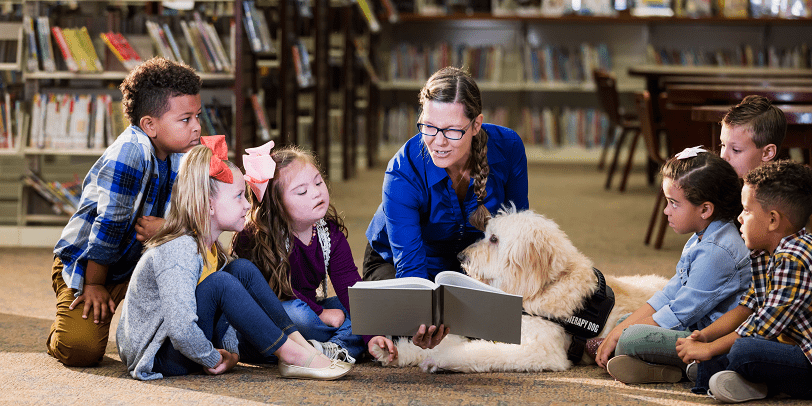How Reading To Dogs Can Help Children’s Literacy Skills.
Who would have known there could be a potential teaching assistant for your child, very close to home – in the form of your loyal family dog? Sounds bonkers? Read our Holidays4Dogs article to find out how reading to dogs can improve a child’s confidence in learning.
Companion pets have long been known to bring positive benefits to children’s lives. Nowhere is this more astonishing than in the field of education.
The ‘Bark and Read Foundation’ was set up by the UK’s Kennel Club Educational Trust as a way of helping children foster a passion for reading. Specially trained support dogs visit schools, libraries and other social settings to help children learn to read. It’s a successful scheme which also gives children a sense of responsibility and boosts their confidence.
Aim of the ‘Bark and Read’ scheme.
The scheme aims to improve children’s literacy skills as well as boosting their overall confidence in learning. When the children are reading a book, they are reading to the dog, not the human volunteer. If the children make mistakes, this doesn’t matter.
This is a crucial part of the child’s learning to have an interest in reading and growing their confidence. Not least because, the dog by their side is non-judgmental and has no idea, or cares, whether the words are wrong, or not.
A person will naturally correct a child if they get it wrong. Teachers may be visibly frustrated, or impatient. A dog, on the other hand, is a carefree and willing companion. A dog’s silence on the matter works wonders for children’s confidence.
The dogs are not just attention grabbers. The aim is for the children to just enjoy reading to a dog, a reading companion who is not going to point out their errors, or intervene.
The ‘Bark and Read’ Success story.
Many children report they feel much more comfortable reading with a dog present because they feel less self-conscious. or clumsy. Not surprisingly, having a dog in reading lessons also helps anxious children to feel more comfortable both in the school environment, as well as at home.
In addition to improving literacy skills, children also gain more confidence in other areas of their learning. This includes within the school curriculum, as well as at home; even when there isn’t a dog present.
Where support dogs have been introduced into classrooms, children have become more motivated to read and more inclined to engage in lessons. This is true even without the dogs present, the children still look forward to reading sessions.
Conclusion.
 The Kennel Club scheme is just one of several other UK schemes with similar aims in mind. Therapy Dogs Nationwide run a similar scheme which is supported by the Kennel Club.
The Kennel Club scheme is just one of several other UK schemes with similar aims in mind. Therapy Dogs Nationwide run a similar scheme which is supported by the Kennel Club.
Canine Concern also has specially trained support dogs who work with children in schools and other settings to improve confidence and learning.
If you would like to know more about these charities and how they could help your child, or your school – follow the links for more information.




